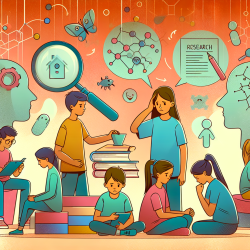Recent research published in Frontiers in Psychology has provided valuable insights into the impact of anxiety on working memory and language abilities in elementary schoolchildren, both with and without Additional Health and Developmental Needs (AHDN). This study highlights the critical need for early identification and intervention for anxiety to improve speech-language outcomes.
Key Findings
The study found that:
- 26% of all children experienced moderate, sub-clinical anxiety.
- Children with AHDN were 10.5 times more likely to experience high anxiety compared to their neurotypical (NT) peers.
- High anxiety was associated with poorer visual and auditory-verbal working memory and lower functional language skills.
Implications for Practitioners
As a speech-language pathologist, understanding the relationship between anxiety and language development is crucial. Here are some actionable steps to integrate these findings into your practice:
1. Early Identification
Screen for anxiety in children with AHDN and NT children. Early identification can lead to timely interventions that may mitigate the negative impact of anxiety on language development and working memory.
2. Tailored Interventions
Develop individualized intervention plans that address both language deficits and anxiety. Techniques such as cognitive-behavioral therapy (CBT) can be integrated with speech-language therapy to provide a holistic approach.
3. Collaborative Approach
Work closely with parents, teachers, and mental health professionals to create a supportive environment. Parental involvement and teacher awareness can significantly enhance the effectiveness of interventions.
4. Continuous Monitoring
Regularly monitor the child’s anxiety levels and language development. Adjust intervention strategies based on ongoing assessments to ensure the best outcomes.
Encouraging Further Research
This study underscores the importance of ongoing research in understanding the complex interplay between anxiety and language development. Practitioners are encouraged to stay updated with the latest research and contribute to the field by sharing their clinical experiences and outcomes.
To read the original research paper, please follow this link: The effect of anxiety on working memory and language abilities in elementary schoolchildren with and without Additional Health and Developmental Needs.










